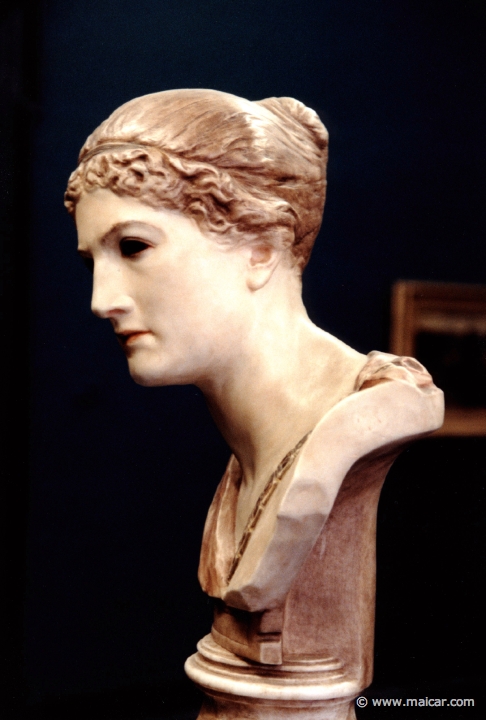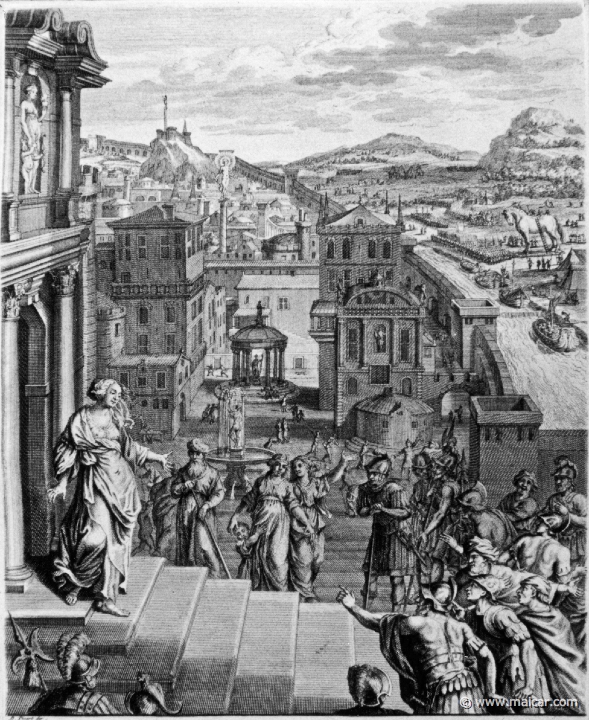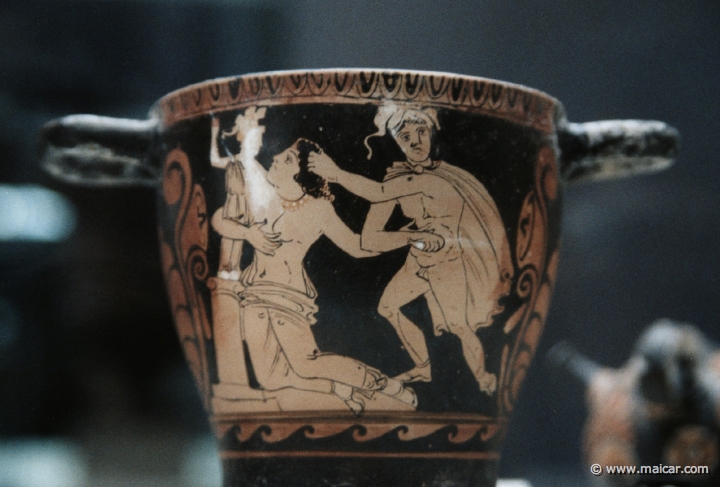|

|
Cassandra. 3307: Bust by Max Klinger, 1857-1920. Hamburger Kunsthalle.
|
|
|
"Have I missed the mark, or, like true archer, do I strike my quarry? Or am I prophet of lies, a babbler from door to door?" (Cassandra. Aeschylus, Agamemnon 1194).
"My son, much tried by the fate of Ilium, you must know that Cassandra alone declared to me this fortune. Now I recall her predicting these things as our people's destiny, often naming Hesperia, often the Italian realm." (Anchises 1 to Aeneas (in exile). Virgil, Aeneid 3.182).
|
|
Cassandra (also called Alexandra) is the Trojan
seeress who uttered true prophecies, but lacking
the power of persuasion, was never believed.
Apollo's gift
J. G. Frazer refers to a couple of scholiasts
when he says that Cassandra and her brother Helenus 1 acquired
their prophetic power, when they, as children, were
left overnight in the temple of Apollo Thymbraeus, and in the following morning serpents were seen licking their ears. Others have said that
Apollo himself, wishing
to gain her love, promised to teach her the
prophetic art. But Cassandra, having learned it,
refused her favors, and then the god, not wishing
to take back his gift, deprived her prophecy of the
power to persuade. This is why she, later in life,
lamented:
"Apollo, my destroyer, for you have
destroyed me ..." (Aeschylus, Agamemnon 1080).
... and acknowledged:
"I promised
consent to Apollo but broke my word ... and ever
since that fault I could persuade no one."
(Aeschylus, Agamemnon 1208ff.).
Advises to kill her brother
Accordingly no one listened when she recommended
to destroy Paris, her
ill-omened brother, shrieking:
"Kill him!
Kill the destroyer of Priam's city! Kill that child!" (Cassandra. Euripides,
Andromache 293).
For when Hecabe 1's was about to give birth to her second son, she dreamt that she had brought forth a fire from which many serpents issued. Following the advice of Cassandra's half brother Aesacus 1, who had learned the art of interpreting dreams from his maternal grandfather Merops 1, they exposed the child, since he declared that Paris was
to become the ruin of the country. But the child
survived, and grew up as a shepherd on Mount Ida.
The Judgement of Paris
Years later the gods attended the wedding party
of Peleus and Thetis,
which Eris spoiled by
throwing among the guests an apple with the
inscription "for the
fairest", thereby starting a dispute between
Hera,
Athena and
Aphrodite, whom
Zeus sent to be judged by
the shepherd of Mount Ida, to put an end to the
quarrel.
After this judgement,
Paris turned from shepherd into prince in the following manner: Some servants of King
Priam 1 came to Mount Ida
in order to fetch a bull to be given as prize in
funeral games. Paris followed them because this was his favorite bull, and having decided to participate in the games, he defeated all other contenders, including his own brothers. One of them, Deiphobus 1, was so angry on account of his defeat that he drew a sword against him and would have killed him, had not Paris quickly taken refuge
in the altar of Zeus. It was then that Cassandra declared that
Paris was her brother, and
Priam 1 then acknowledged
him as his son, receiving him into his palace. This
is how Paris, who had been
expelled from the city following the advice of one
seer, was taken back in accordance with the advice
of another seer, who before had recommended his
death.
Oenone 1
From this time on,
Paris devoted himself to
obtain Helen, the prize
that Aphrodite promised him when he judged the three goddesses; and accordingly he abandoned Oenone 1, his love from Mount Ida, who never accepted that he could endure to desert her, although Cassandra, seeing her fruitless love and knowing what Oenone 1 was up to, had told her:
"What are you
doing, Oenone? Why commit seeds to sand?"
(Cassandra to Oenone 1. Ovid, Heroides 8.115).
|

|
3125: Cassandra warns the Trojans. Engraving by Bernard Picart, 1673-1733.
|
|
Helen
When Paris finally
sailed to fetch Helen in
Sparta, Cassandra uttered
new fiery prophecies, saying:
"Where are you
going? You will bring conflagration back with you.
How great the flames are that you are seeking over
these waters, you do not know." (Cassandra to Paris. Ovid,
Heroides 16,120).
And when on Paris'
return, Cassandra saw
Helen coming into
Troy, she tore her hair and
flung away her golden veil; but the city
nevertheless received this woman as a jewel meant
to enhance its beauty.
Suitors
Two men have been reported to have come to
Troy during the war, wishing to wed her. One of them was Coroebus 2, son of Mygdon, the king of the Bebrycians, whom Heracles 1 had killed
years ago. The other one mentioned in this
connection is Othryoneus, who, as they say, brought
no gifts except his own efforts to repel the
Achaean invaders. It is said that
Priam 1 promised that he would give Cassandra to him; but there was no occasion, since Othryoneus was killed in battle by Idomeneus 1, the king of Crete. As for Coroebus 2, he perished, slain either by Neoptolemus, or
Diomedes 2, or
Peneleus.
The WOODEN HORSE
Near the end of the
Trojan War, Cassandra
declared that there was an armed force hidden
inside the WOODEN
HORSE that the Achaeans had abandoned in the
plain, feigning retreat. Again no one listened,
though the Trojan seer
Laocoon 2 confirmed her. But since Laocoon 2
was overwhelmed by adverse circumstances, many
argued that the man had got what he deserved, and
that the horse should be brought to the shrine of
Athena (the same goddess
who was misleading them), which they did, thus
laying open the heart of the city.This is how the
Trojans brought the fateful engine into the city,
and with it the enemy armed force that was hidden
inside. When night fell, the armed force came forth
and opened the gates of the city to the rest of the
army.
Cassandra outraged
Thanks to that clever device
Troy was conquered. As the wrath of the Achaeans spread over the city, all buildings, except those belonging to traitors, were set on fire and destroyed. And protected by night, they slaughtered whomever they found on the streets, or in homes, or in temples. The members of the Trojan royal family, seeing
what was happening, fled to the temples to seek
protection. But to no avail; for while
Priam 1 was slaughtered
by Neoptolemus at
the altar of Zeus,
Cassandra was captured by Ajax 2 in the sanctuary of
Athena, and raped. It is told that she was clinging to a wooden
image of the goddess, which was knocked over from
its stand, as Ajax 2 dragged her away. Some have asserted (but others find this account too bold) that the image turned away at the time Cassandra was violated. In any case, it was then that Coroebus 2, Cassandra's suitor, died; for he, seeing her outraged and abused, attacked the superior enemy in a passion of rage and was slain.
The gods punished the outrage
On account of this outrage the Achaean kings
assembled, and Odysseus
advised to stone Ajax 2 to
death for his crime. However, no punishment was
decided by the assembled
ACHAEAN LEADERS,
and accordingly the gods made them pay their
omission and their having despoiled the shrines by
sending storms and contrary winds. And much more in
addition, as the offended goddess declared:
"I will impose
on them a return that is no return." (Athena to
Poseidon. Euripides,
Daughters
of Troy 75).
In one of these storms,
Athena threw a
thunderbolt against Ajax 2's ship; and when the ship went to pieces he
made his way safe to a rock, but then
Poseidon smote the rock
with his trident and split it, and
Ajax 2 fell into the sea
and perished.
Freedom
|

|
Ajax 2 dragging Cassandra. 5727: Ajax, Cassandre et le Palladion. Skyphos. Campanie "peintre de Capoue 7531". 350-330 avant J.-C. Musée d'Art et d'Histoire, Genève.
|
|
Some have said that, for his services as a
traitor, Agamemnon
gave Helenus 1, and
also Cassandra, their freedom; and after the
intercession of Helenus 1 on behalf of Hecabe 1 and Andromache,
Agamemnon again gave
these their freedom. They add that these four
migrated to the Thracian Chersonese and settled
there with twelve hundred followers.
Curse attributed to Cassandra
When the victors divided the spoils, Eurypylus 1, one of the ACHAEAN
LEADERS, got a chest with an image of
Dionysus 2, wrought by
Hephaestus, and once
upon a time given as a gift by
Zeus to Dardanus 1, ancestor of the Trojans. Some have said that the chest was left by Aeneas
when he fled from Troy; but others say that Cassandra threw it away to be a curse to the Achaean who found it. In any case, they tell that when Eurypylus 1 opened the chest, on seeing the image of the god, he went mad. So instead of returning to Thessaly, he (who was lucid only at intervals, being insane the rest of the time) went to Delphi to inquire the oracle about his illness. The oracle told him that he was to set down the chest and make his home where he should see people offering a strange sacrifice. Eurypylus 1's ships were then carried by the wind to the sea off Aroe (Patrae), where he saw a young man and a maiden about to be sacrificed. Eurypylus 1 then understood the oracle, and the locals, suspecting that there was a god inside the chest, recalled the oracle they had themselves received concerning a king whom they had never seen before. In this manner, both sacrifice and sickness came to an end. Yet others have said that this happened not to Eurypylus 1, but to Eurypylus 7, a man who had received the chest from Heracles 1, after
having joined his expedition against
Troy.
Death in Mycenae
Others say that when
Troy was captured and the
Achaeans divided the spoils, Cassandra became the
prize of Agamemnon.
Now Oeax, wishing to avenge the death of his
brother Palamedes,
informed Agamemnon's
wife Clytaemnestra
that Cassandra was being brought by her husband as
a concubine to her house. As a result,
Agamemnon fell victim
of a conspiracy conceived by his own wife and her
lover Aegisthus, and
was murdered along with Cassandra, who predicted
her own fate shortly after her arrival to
Mycenae:
"... for me
waits destruction by the two-edged sword." (Cassandra. Aeschylus, Agamemnon 1149).
|